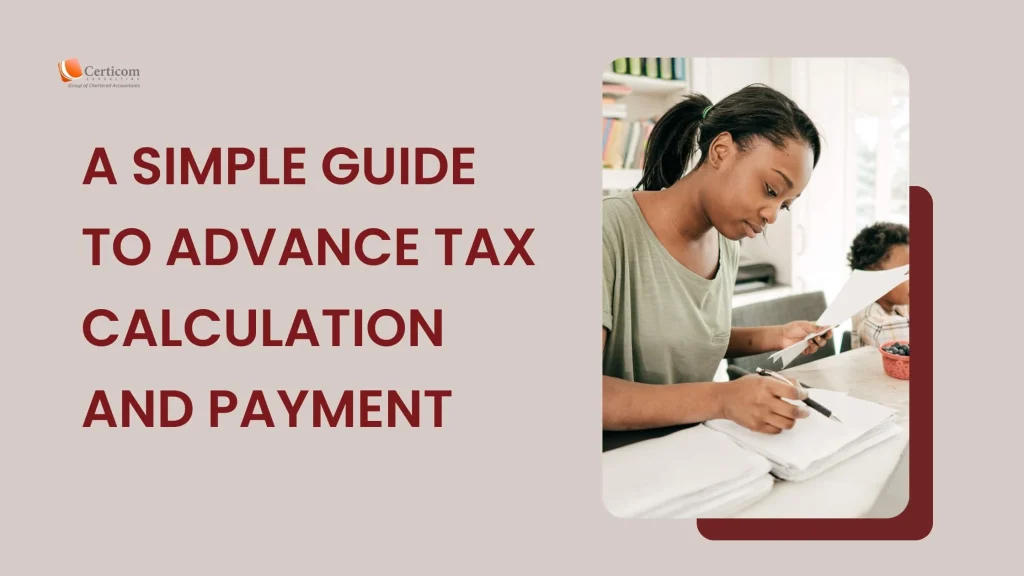A Simple Guide to Advance Tax Calculation and Payment

Advance tax follows the ‘pay-as-you-earn’ principle, requiring taxpayers to pay income tax in installments during the financial year instead of making a lump sum payment at the end. It is governed by Sections 208 and 209 of the Income Tax Act, 1961 and applies to individuals whose estimated tax liability exceeds INR 10,000 in a financial year.
Exemption: Senior citizens (aged 60 or above) who do not earn income from business or profession are not required to pay advance tax.
How to Calculate Advance Tax?
Advance tax liability varies based on individual income. Follow these steps to determine how much you need to pay:

Step 1: Estimate Total Income
Calculate expected earnings from all five income heads:
- Salary
- House Property
- Business or Profession
- Capital Gains
- Other Sources
Step 2: Deduct Exemptions and Deductions
Identify and subtract eligible deductions under applicable sections (e.g., Section 80C, 80D, 80E).
Step 3: Compute Net Taxable Income
Formula:
Net Taxable Income = Total Estimated Income – Eligible Deductions & Exemptions
Step 4: Calculate Tax Liability
Determine tax payable based on the chosen tax regime (Old vs. New).
Step 5: Adjust for TDS/TCS
Subtract TDS/TCS (if already deducted) from the calculated tax liability.
Step 6: Determine Advance Tax Payable
Advance tax must be paid on the net tax amount arrived at in Step 5.
When to Pay Advance Tax?
The due dates for advance tax payments differ based on the type of taxpayer:
For Individual and Corporate Taxpayers
- By 15th June – Pay 15% of the estimated tax liability.
- By 15th September – Pay 45% of the estimated tax liability (minus tax already paid).
- By 15th December – Pay 75% of the estimated tax liability (minus tax already paid).
- By 15th March – Pay 100% of the estimated tax liability (minus tax already paid).
For Presumptive Taxpayers (Under Section 44AD/44ADA)
- By 15th March – Pay 100% of the estimated tax liability in a single installment.
How to Pay Advance Tax?
Advance tax can be paid through online and offline methods.
Online Payment Process
- Visit the Income Tax e-Filing Portal.
- Click on ‘e-Pay Tax’ under ‘Quick Links’.
- Enter PAN, confirm it, and provide your mobile number.
- Verify the OTP received and proceed under the ‘Income Tax’ tab.
- Select the Assessment Year and ‘Advance Tax (100)’.
- Enter tax details such as tax amount, surcharge, cess, interest, and penalties.
- Choose a payment mode (Net Banking, Credit/Debit Card) and enter details.
- Verify the challan preview and click ‘Pay Now’ to complete the transaction.

Offline Payment Process
- Obtain Challan 280 from an authorized bank.
- Fill in personal details, PAN, Assessment Year, and tax payment details.
- Submit the completed Challan 280 along with the payment at the bank.
By following these guidelines, taxpayers can ensure timely compliance and avoid interest or penalties for late payments. Advance tax planning helps in better financial management and prevents last-minute tax burdens. Stay informed and pay your taxes efficiently!
Related Post
A Beginner’s Guide to E-Filing Income Tax Return for FY 2024-25
Faking Tax Deductions? You Could Be Penalised Up To 200% Under Income Tax Rules
Book A One To One Consultation Now For FREE
How can we help? *




